Navigating the Early Stages of Sobriety
Embarking on the journey of recovery from addiction requires dedication, resilience, and a guided approach. Particularly in the early stages, establishing a foundation of success involves a strategic combination of practices and support systems. This article outlines three crucial guidelines designed to provide a roadmap for individuals seeking to navigate their early recovery effectively.
Key Facts About Addiction Recovery
- Structured routine provides stability and reduces anxiety, crucial during the first 90 days of recovery.
- Emotional stability is enhanced through predictable daily activities, empowering individuals to manage challenges.
- Using the SMART goals framework helps set realistic and achievable recovery objectives.
- Support systems significantly improve recovery outcomes by offering emotional, practical, and motivational support.
- Family, peer support groups, and professional help are all critical types of support in the recovery process.
- Engaging in self-care activities can lead to a 42% increase in recovery success rates.
- Regular exercise, mindfulness, and social engagement are valuable self-care practices during recovery.
- Celebrating small victories in recovery boosts motivation and reinforces positive behavior.
- Maintaining motivation in recovery involves Purpose, Practice, Perseverance, Pray, and Praise—the Five Ps.
- Identifying triggers and developing healthy coping mechanisms are crucial for preventing relapse.
1. Establish a Structured Routine
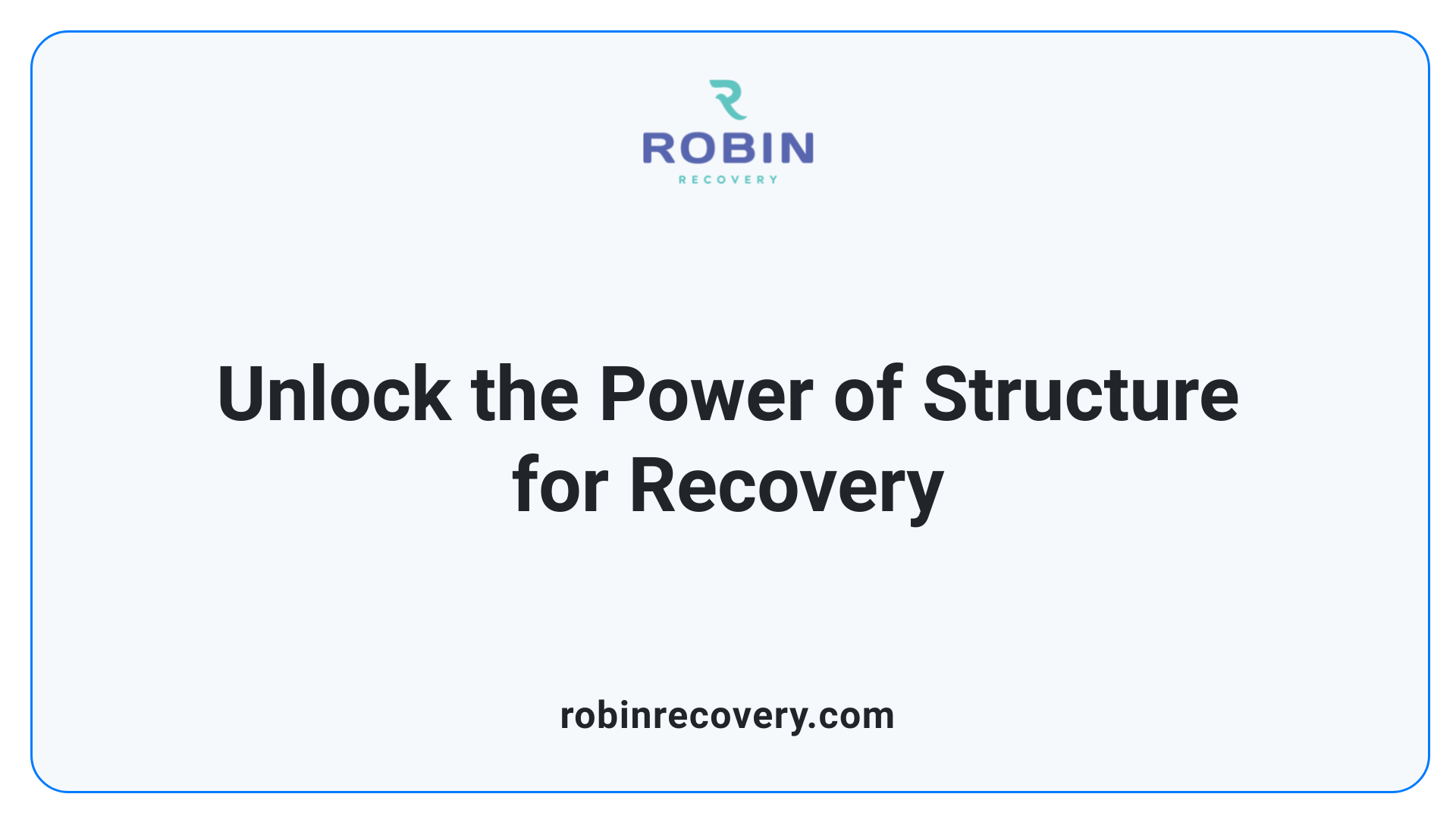
Importance of routine in recovery
Establishing a structured routine is a cornerstone of successful addiction recovery. Structure creates a sense of stability and predictability in one’s daily life, significantly reducing anxiety. This is particularly crucial during the first 90 days after ceasing substance use, a period marked by emotional upheaval and potential crises. By incorporating predictable daily activities, individuals can better manage the stressors that arise during recovery.
A consistent routine also fosters self-discipline and responsibility. It encourages individuals to allocate time for essential self-care practices, ensuring that both physical and emotional needs are met. When recovery becomes structured, individuals are less likely to face the chaos often associated with addiction, allowing for focused progress toward sobriety.
Emotional stability through structure
Emotional well-being is greatly enhanced by routine. Establishing clear daily activities not only helps individuals feel in control but also provides comfort amid the inevitable challenges of recovery. As people begin to rebuild their lives, routines empower them to manage their time effectively, leading to improved emotional health.
The predictability of a structured lifestyle offers comfort and stability. As accomplishments, no matter how small, accumulate, self-confidence grows. This gradual restoration of trust—both in oneself and in relationships that may have been strained during addiction—is highlighted by the consistent attainment of daily goals. Furthermore, practicing mindfulness techniques within a routine can assist in regulating emotions, allowing for better coping with cravings and stressors that might trigger relapse.
Daily routines for early recovery
Creating effective daily routines involves setting realistic and achievable goals that fuel motivation. Utilizing the SMART goals framework—Specific, Measurable, Achievable, Relevant, and Time-bound—can help individuals outline clear objectives for their recovery process. For instance:
| Goal Type | Example | Why It’s Important |
|---|---|---|
| Self-Care | Exercise for 30 minutes each day | Boosts physical health, releases endorphins to improve mood |
| Social Support | Attend a support group meeting once a week | Builds a sense of community and accountability |
| Therapeutic Engagement | Schedule therapy sessions bi-weekly | Provides professional guidance and coping strategies |
| Mindfulness Practice | Meditate for 10 minutes daily | Helps in managing stress and cravings |
Incorporating such activities not only fills the void that substance use might have previously occupied but also encourages individuals to engage in enjoyable pursuits with sober friends. This way, recovery is framed positively, making the process more appealing and sustainable.
To further solidify this structured approach, individuals are advised to include check-ins with their support network, which can greatly enhance accountability. These interactions provide reinforcement of commitment towards recovery and assist in recognizing any early signs of potential relapse.
A personalized self-care plan that incorporates routines can lead to healthier habits and coping mechanisms, fostering resilience. It also prioritizes essential self-care activities that vary widely from person to person, such as engaging in hobbies, maintaining a balanced nutrition plan, and establishing a proper sleep schedule.
In essence, structuring daily routines in early recovery is about creating a framework that supports an individual’s journey toward sobriety while ensuring that they remain grounded, connected, and resilient. By developing routines that cater to their specific needs, individuals bolster their emotional stability—set against the backdrop of their recovery—and prepare themselves for the growing responsibilities and challenges ahead.
Successful recovery, therefore, is not just about eliminating substance use; it is about replacing it with a fulfilling life that supports long-term well-being. The integration of routines, social networks, and coping strategies can profoundly enhance recovery outcomes and minimize the risk of relapse.
2. Strengthen Your Support Network
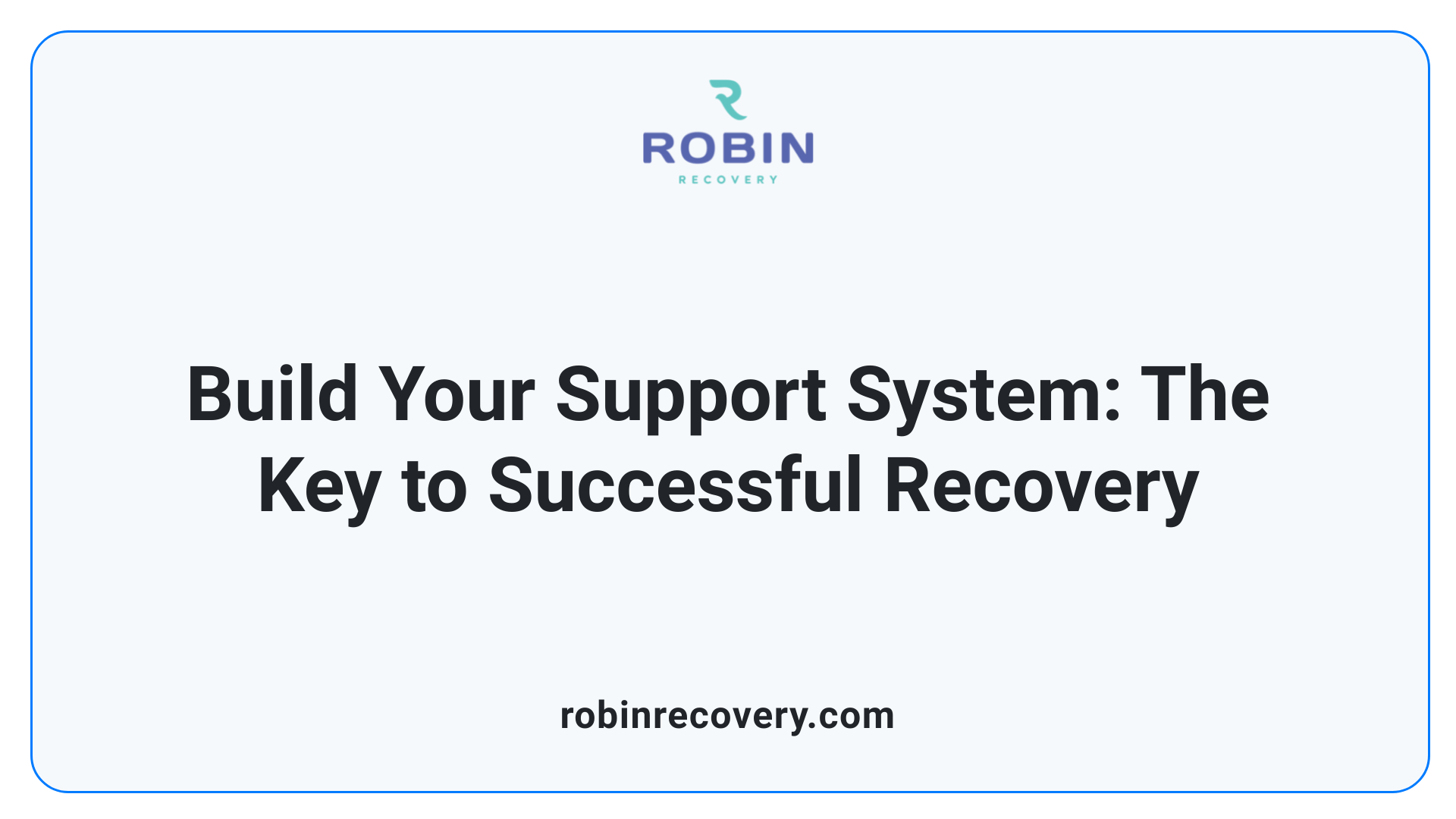
Role of support systems in recovery
Building a robust support system is vital for anyone navigating the challenging path of addiction recovery. Effective support networks significantly enhance recovery outcomes, providing the emotional, practical, and motivational backing essential for sustained sobriety. Individuals surrounded by a reliable circle of friends, family, and support groups often report feeling less isolated and more equipped to face challenges.
Social support influences recovery in multiple ways:
- Emotional Validation: Having someone to listen and understand can validate one’s feelings, reducing feelings of loneliness and despair.
- Practical Assistance: From helping with everyday tasks to providing housing or financial support, friends and family can relieve practical pressures.
- Motivation: Support from others encourages individuals to remain focused on long-term goals, instilling a sense of accountability.
Types of support networks
Various types of support networks can be instrumental during the recovery process:
- Family Support: Family can provide emotional support and practical assistance, helping to restore trust and strengthen relationships strained during addiction. Family-based interventions like the Community Reinforcement and Family Training (CRAFT) model focus on promoting engagement in recovery, further enhancing positive outcomes.
- Peer Support Groups: Organizations like Alcoholics Anonymous (AA) and Narcotics Anonymous (NA) create environments where individuals with shared experiences can find understanding and mentorship. Engaging with others who are also in recovery fosters a sense of community and accountability.
- Professional Support: Mental health professionals provide tailored treatment plans and therapy options. Cognitive-behavioral therapy (CBT) and mindfulness interventions are strong tools to help manage cravings and navigate the emotional turbulence of recovery.
- Sober Friends: Surrounding oneself with peers who prioritize sobriety can inspire motivation and encourage positive behaviors. This includes attending social events or activities that do not center around alcohol or drug use.
Impact of family and peer support
The role of family and peer support cannot be overstated. Numerous studies correlate strong support systems with a higher success rate in addiction recovery. Here are a few significant aspects:
- Emotional Backing: Family members can help manage emotional burdens, providing a safe space to express fears and challenges. Regular check-ins strengthen these bonds, enhancing commitment to recovery.
- Accountability: Family and friends can remind individuals of their recovery goals and offer gentle nudges when motivation wanes. This accountability is crucial, especially in the first 90 days of recovery when the risk of relapse is elevated.
- Resilience Building: Engaging in discussions about triggers and challenges with loved ones fosters resilience. Open communication aids in developing effective coping strategies, further supporting relapse prevention.
The adoption of the SMART goal framework—where goals are Specific, Measurable, Achievable, Relevant, and Time-bound—can streamline the process of recovery. Family members can help individuals identify these goals, leading to a clearer path towards success. Additionally, celebrating achievements, no matter how small, reinforces positive behavior and fosters an environment of encouragement.
Strengthening your network
To effectively strengthen a support network, involve family and friends by:
- Educating them about addiction and recovery principles to foster understanding.
- Encouraging participation in therapy sessions or support group meetings, which can demystify the recovery experience for loved ones.
- Establishing clear boundaries and communication about how they can best support you without enabling negative patterns.
In summary, committed involvement from family, friends, and peers significantly enhances recovery outcomes for those overcoming addiction. Creating a diverse support network not only aids in managing emotional crises but also fosters personal growth, communal responsibility, and a greater likelihood of long-term sobriety. As individuals prioritize building these connections, they establish not just a support system but a foundation for a healthier, substance-free life.
3. Prioritize Self-Care Practices
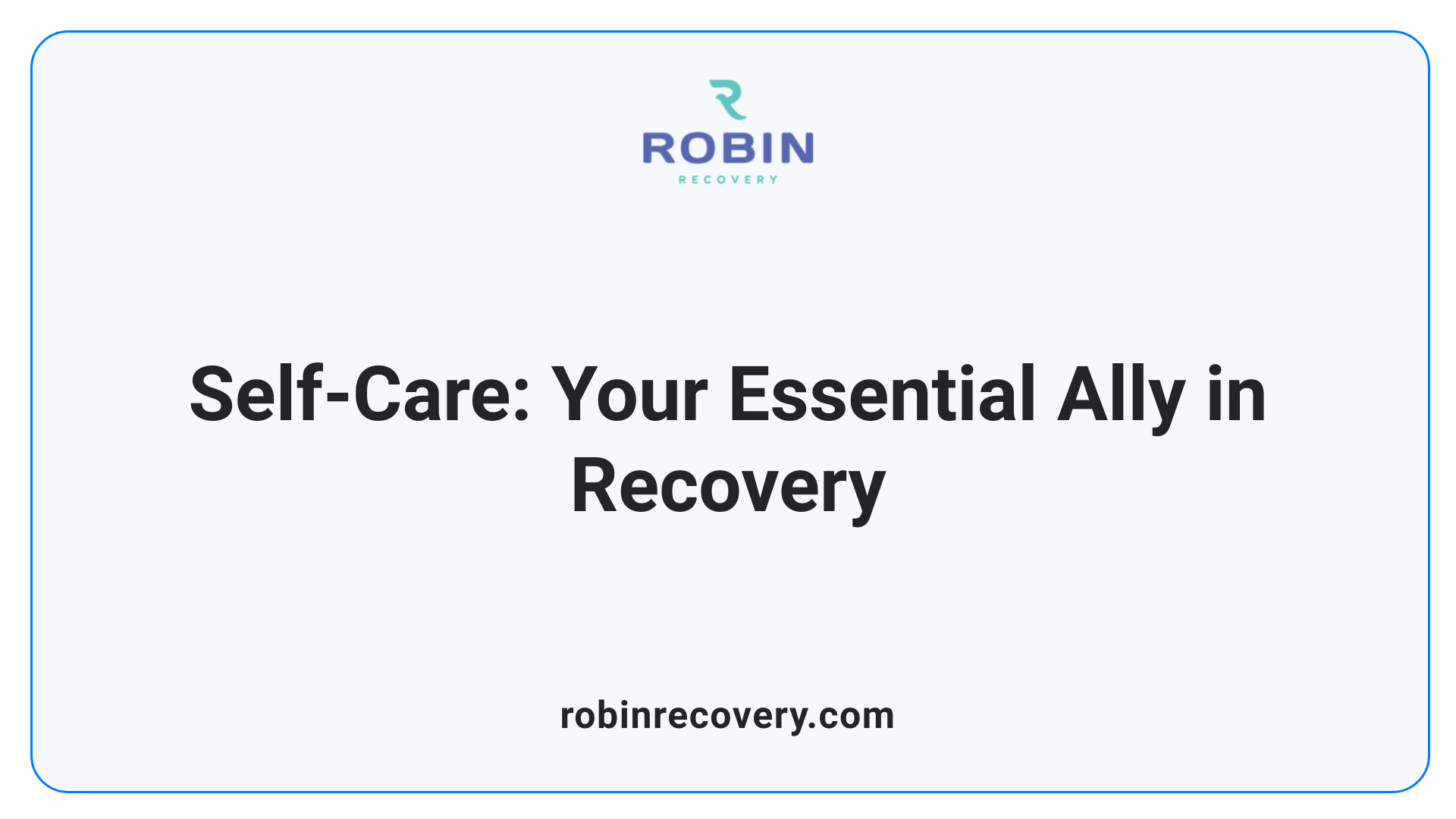
Role of Self-Care in Recovery
Self-care plays a pivotal role in addiction recovery by enhancing both physical and emotional well-being. It acts as a foundational pillar that supports the recovery process, addressing the mental and physical needs of individuals. Regular self-care activities not only contribute to improved recovery outcomes but also foster a sense of joy and relaxation, allowing individuals to reconnect with themselves amid the stressors of recovery. The statistics show that prioritizing self-care can lead to an impressive 42% increase in recovery success rates, highlighting its critical importance in healing.
Establishing a self-care routine during early recovery helps individuals manage stress and anxiety. A structured approach aids emotional stabilization, which is particularly essential in the first 90 days post-substance use cessation. This phase is often marked by emotional chaos and cravings; engaging in self-care practices can provide comfort and predictability.
Examples of Self-Care Activities
Incorporating a variety of self-care activities can significantly enhance an individual’s recovery journey. Here are some effective examples:
| Self-Care Activity | Description | Benefits |
|---|---|---|
| Regular Exercise | Engaging in physical activity, such as jogging, yoga, or team sports. | Promotes physical health and boosts mood via endorphin release. |
| Mindfulness and Meditation | Practicing breathing techniques or attending mindfulness classes. | Helps reduce stress and manage cravings effectively. |
| Healthy Nutrition | Emphasizing balanced meals with nutritious foods. | Supports physical health and fosters overall well-being. |
| Creative Expression | Participating in arts, writing, or music-making. | Allows for emotional processing and stress relief. |
| Social Engagement | Connecting with supportive peers or attending support groups. | Builds accountability and reduces feelings of isolation. |
| Journaling | Keeping a diary to record thoughts and emotions. | Encourages self-reflection and promotes emotional clarity. |
| Sleep Hygiene | Establishing a regular sleep routine with adequate rest. | Enhances cognitive functioning and emotional balance. |
Impact on Emotional and Physical Well-Being
Engaging in self-care activities directly influences emotional and physical health. By prioritizing self-care during recovery, individuals can cultivate a sense of control over their lives, thereby reducing feelings of anxiety and depression. Self-care is not just about pampering oneself; it is about creating a supportive environment where recovery can thrive.
Promoting mental health through self-care practices enables individuals to develop healthier coping mechanisms. For instance, mindfulness and meditation are known to enhance emotional regulation, which is crucial during recovery's inevitable challenges.
Moreover, the physical benefits of exercise cannot be overlooked. Regular physical activity is shown to activate the same neurochemical pathways as certain substances, providing a natural high that can substitute the relief previously sought through substance use.
Ultimately, effective self-care practices lead to improved resilience against triggers and stressors, helping individuals navigate their recovery journey more successfully. Those who actively prioritize self-care report feeling more energized, stable, and focused on their recovery goals. They are also better equipped to enjoy and celebrate small victories, enhancing motivation throughout their journey.
In summary, self-care is a vital component of recovery, encompassing various activities that cater to both physical health and emotional well-being. It establishes a foundation for individuals to rebuild their lives, develop meaningful connections, and engage in enjoyable pursuits that promote sober lifestyles. Building a personalized self-care plan that incorporates daily routines can be transformative, ultimately laying the groundwork for long-term sobriety.
Maintaining Motivation in Recovery
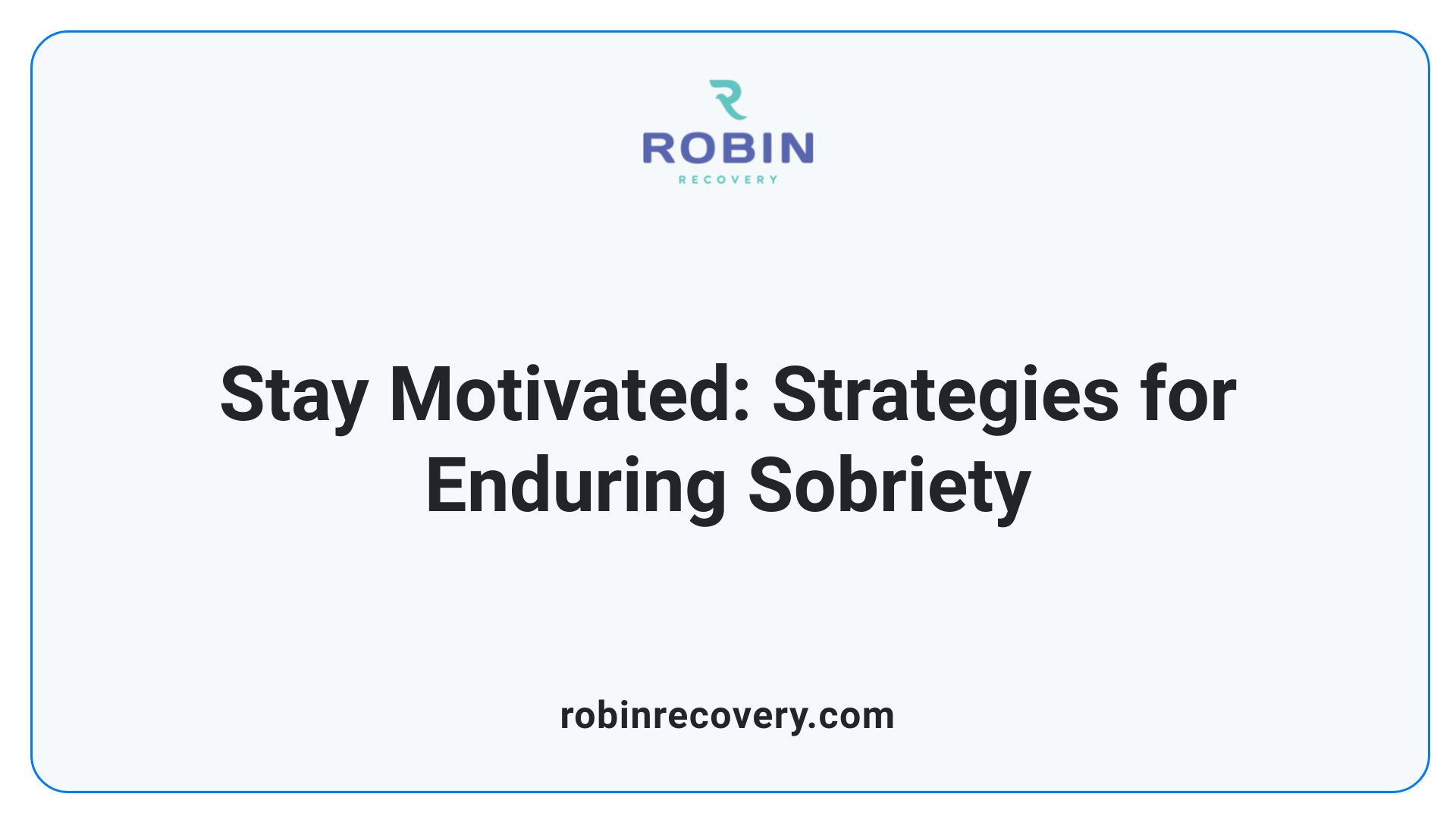
How can individuals maintain motivation during the early stages of recovery?
Maintaining motivation in the early stages of recovery is essential for long-lasting sobriety. Individuals can focus on the "Five Ps": Purpose, Practice, Perseverance, Pray, and Praise.
- Purpose: Establishing meaningful goals helps combat feelings of purposelessness. Setting clear and achievable goals using the SMART framework can promote focus.
- Practice: Consistent engagement in supportive activities like attending support groups or practicing mindfulness fosters healthier habits. Programs such as Celebrate Recovery provide community support and structure crucial for motivation.
- Perseverance: Recognizing recovery as a long-term commitment encourages daily dedication. Understanding that setbacks may occur but are not permanent helps individuals stay resilient.
- Pray: Connecting with a higher power through prayer can help align thoughts and actions, providing comfort and strength in facing challenges.
- Praise: Celebrating small victories boosts motivation. Acknowledging progress in recovery reinforces positive behaviors and encourages further engagement.
What motivational strategies can help overcome recovery challenges?
To effectively navigate recovery challenges, developing healthy coping mechanisms is critical. Engaging in regular physical activity not only boosts overall health but also elevates mood by releasing endorphins.
Additionally, practicing mindfulness and meditation aids in stress management and emotional regulation. Identifying and managing triggers helps maintain control over cravings. Establishing a robust support network creates accountability, with family and friends providing both emotional backing and practical assistance.
Recognizing the importance of self-care practices can enhance emotional well-being, mitigating feelings of anxiety and depression that often accompany the early stages of recovery. Adopting these strategies fosters resilience, keeping individuals motivated and focused on sustaining their recovery journey.
How do individuals maintain focus in the recovery process?
Maintaining focus during recovery involves several strategies:
- Structured Routine: Developing a daily routine cultivates stability and predictability.
- Setting Achievable Goals: Utilizing the SMART criteria helps individuals stay oriented toward their objectives.
- Regular Check-ins: Keeping in touch with a therapist or support group ensures accountability and reinforcement of commitment.
- Identifying Triggers: Recognizing emotional and environmental triggers aids in developing preventative measures against relapse.
This multifaceted approach, focusing on stability, emotional support, and personal growth, fosters a meaningful recovery experience.
Embracing the Path to Recovery
Navigating the early stages of recovery involves proactive steps and an unwavering commitment to personal growth. By focusing on structured routines, strengthening support systems, and prioritizing self-care, individuals can lay a solid foundation for lasting sobriety. Embracing these guidelines ensures that recovery is approached not as a solitary endeavor, but as a holistic journey supported by community, personal dedication, and mindful practices. Take these guidelines to heart, and remember that while the road to recovery may be challenging, it is also enriching and profoundly transformative.
References
- How to Keep a Grip on Early Recovery – 3 Guidelines to Guarantee ...
- 3 More Guidelines to Guarantee Success in Early Recovery
- How To Keep A Grip On Early Recovery – 3 Guidelines To ...
- How to Keep a Grip on Early Recovery – 3 Guidelines to Guarantee ...
- 3 More Guidelines to Guarantee Success in Early Recovery
- 3 More Guidelines to Guarantee Success in Early Recovery
- Navigating the Challenges of Early Recovery: Tips for Success
- Empower Your Path: Release These 3 Elements Beyond Addiction ...
- Risks Of Early Rehab Exit: No Shortcut To Success
- Relapse Prevention and the Five Rules of Recovery - PMC
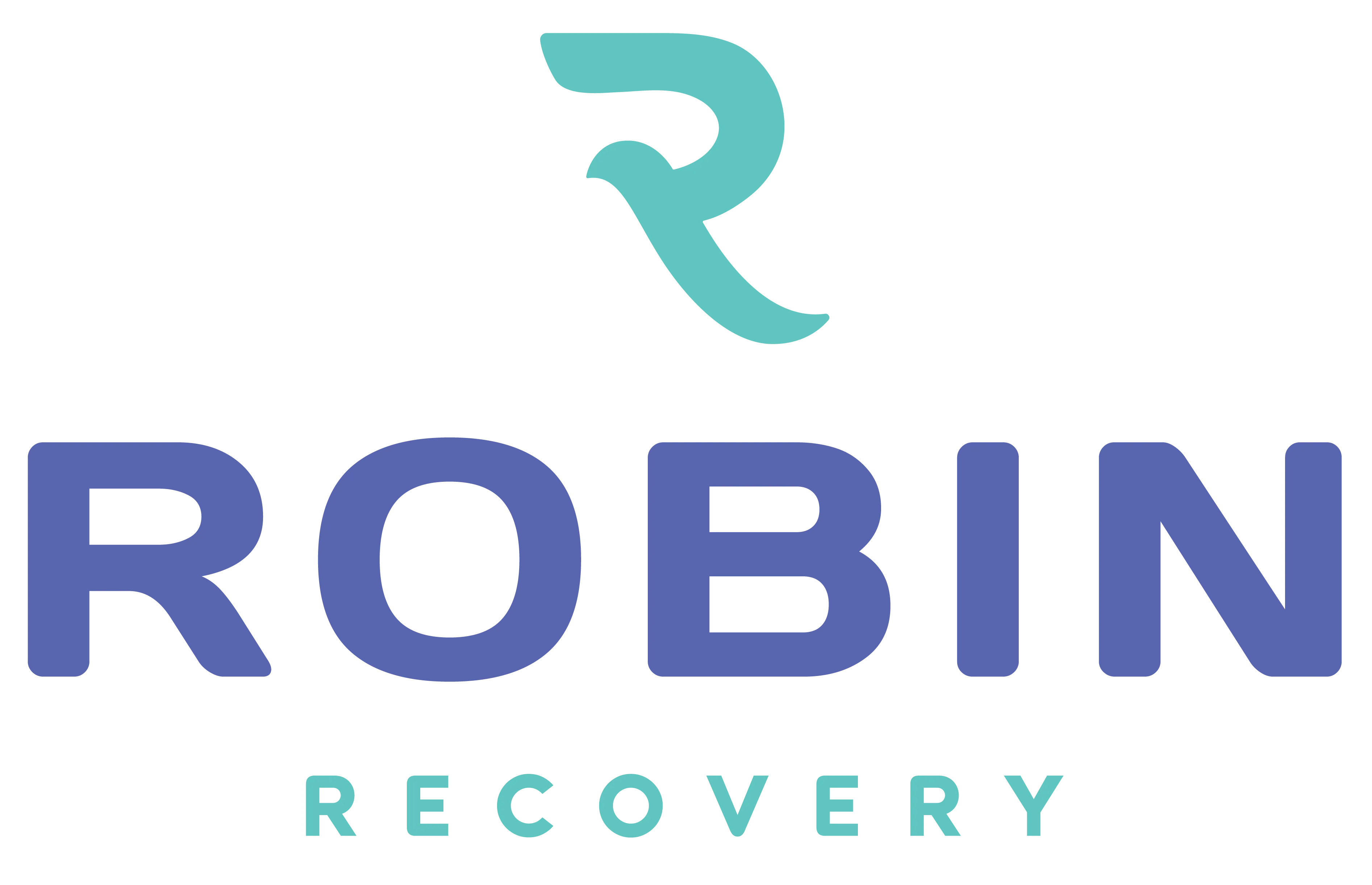
.svg)

.svg)

.svg)
.svg)






































































































